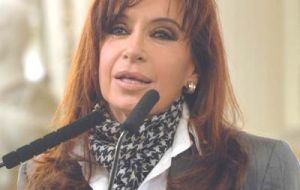MercoPress. South Atlantic News Agency
Farmers' conflict: behind harsh words, dim light of hope
 Pte. Fernadez during her speech at the Gov. House
Pte. Fernadez during her speech at the Gov. House Argentine President Cristina Fernandez de Kirchner defended on Monday her decision to impose a controversial sliding tax system on agricultural exports and said farmers opposing her government policies are undermining the country's fight against poverty.
"I'm asking all Argentines whether we are really committed to taking on the issue of poverty, because resolving poverty without redistributing income, without touching windfall profits, is impossible'' she said in a speech at the Casa Rosada in Buenos Aires surrounded by ministers, governors, mayors, union and business leaders and Kirchner' faithful, but to which farm leaders were not invited. Mrs. Kirchner linked revenue from the taxes to the improvement of hospitals, health clinics, rural schools and roads in provinces. The speech came two hours after the government didn't send a representative to meet with farm leaders in a negotiation session convened by Argentina's ombudsman Eduardo Mondino. The three-month stand off over export taxes on grains and oilseeds have prompted food shortages, road blockades and the biggest anti-government protests since 2001. The President's husband former President Nestor Kirchner claimed that farmers have "extorted" the country since the tax increase was introduced March 11 and that the levies help ensure food at affordable prices to Argentines. Mrs. Kirchner said the government has spent 12 billion US dollars to maintain a competitive exchange rate that benefits farmers and other exporters and that it is "legitimate" to impose higher taxes on farmers. "We all want to fight poverty, no more hungry kids in Argentina, better hospitals but not only with our pockets. Let it be a shared challenge, particularly from those who were applauding the President at government house", said Mario Llambías one of the four farm leaders who had to sit through the message from the Ombudsman's office. During an improvised press conference following Mrs. Kirchner's speech the four leaders supported the goal of fighting poverty, but insisted in reviewing the sliding export tax system, which at such high rates (45%) only favours "the big soybean planting pools, that the government says is intent in clipping their wings". "With such high rates only the big organized financial groups can make a handsome profit, not the small or medium farmers, they'll go broke", argued Eduardo Buzzi. Farmers lifted their third strike on Monday morning hoping on the resumption of dialogue sponsored by the Ombudsman. However Buzzi anticipated that the state of "alert and vigilance" by farmers at road sides remains at least until tomorrow (Tuesday) when a new meeting of farmers and government representatives has been convened by the Ombudsman. But in spite of the harsh words and reactions, possibly for the first time since the three months conflict began, government and farmers have agreed on an objective, combating poverty and the tone of the presidential address was far less irritating or aggressive than in previous occasions. Furthermore Mrs Kirchner admitted having committed mistakes, so have farmers, and a general invitation to all Argentines to participate in a national dialogue could open a path to an understanding with neither side loosing face. Public opinion polls overwhelmingly indicate Argentines want a quick and fair end to the three month conflict. Some analysts believe they can feel the subtle hand of the Catholic Church, making poverty the issue after the bishops adopted a more prominent and open role in expressing fears of populace disappointment with shortages and growing social unrest because of the ongoing conflict that has paralyzed the rural economy in many provinces. Besides Mrs. Kirchner at the beginning of the month was in Rome for the FAO meeting on global food emergency, but she also visited the Vatican to address some pending issues with the Argentine Catholic Church. Sometimes a visit to St Peter's basilica can work wonders. Argentina is among the world's leading exporters of soybeans, corn, wheat, beef and other commodities so the absence of Argentina from world markets is having an international impact. Agriculture exports and increased crop volumes have set the foundations for the six year running expansion of the Argentine economy.




Top Comments
Disclaimer & comment rulesCommenting for this story is now closed.
If you have a Facebook account, become a fan and comment on our Facebook Page!